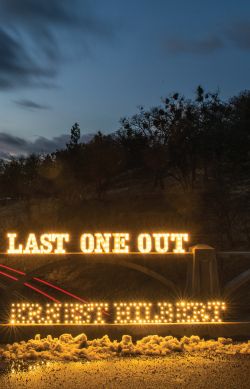There are public poems here, and very private songs, there are also poems that are unafraid to look into the mirror and see “slow, confused motions of a ghosts,” and poems that light our path through the darkness as if we are boys who hunt for fireflies, and these poems in our hands “swim like wind-stirred lanterns.” There are lines which make me think of Heaney’s way of mining human experience not to hear stories, but echoes. To hear the music of those echoes between our days is no small thing. It takes a true artist, it takes someone who can make a poem of just a few lines wherein time pauses, and silences come out — and become visible, while “the light is leaving and windows brighten / across the street.” Last One Out is a very beautiful book. It sings.
— Ilya Kaminsky, author of Deaf Republic and Dancing in Odessa
Non omnis moriar — “I shall not die completely” — Ernest Hilbert attaches this motto to his latest book of poems, and it makes sense. Last One Out is a book haunted by loss: besieged and ruined cities, a blasted tank abandoned in the desert, ruined houses sifted for what trinkets of past lives remain. It begins with the poet’s grandfather and father — both long dead — and continues with an atavistic yearning to enter the past and drag it forward into the present. The book isn’t a lament, though: it’s a journey, taking us from images of the poet as bereaved son to a portrait of the poet as protective and loving father. Take the trip.
— Robert Archambeau, author of Inventions of a Barbarous Age: Poetry from Conceptualism to Rhyme
There are plenty of people who have declared themselves poets, but not nearly as many poems worth reading. Ernest Hilbert’s, however, take their readers seriously. Mundane stuff, like tubes of sunscreen, are described in new and bracing ways (“Kinked at center, cargo of clouds squeezed out”), and even at their grimmest, his lines are alive with wit (“We boil horses and harness girls to tow / Corpses”). These are well-made, moving poems, designed with our pleasure in mind.
— Jason Guriel, author of The Pigheaded Soul: Essays and Reviews on Poetry and Culture

Order from:
Ernest Hilbert’s collections include Sixty Sonnets, All of You on the Good Earth, and Caligulan, which won the 2017 Poet’s Prize. He lives with his wife and son in Philadelphia where he works as an antiquarian bookseller.